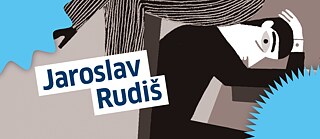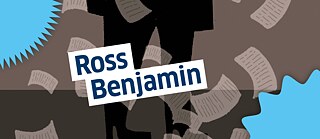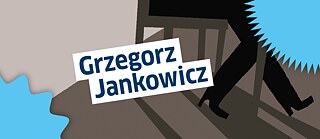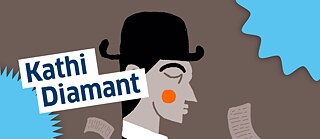Zeitgeister On Air Being Kafka #6 with Jaroslav Rudiš

Czech author and musician Jaroslav Rudiš is touring Europe with his group, the Kafka Band. These concerts attract audiences young and old, as he tells Soraya Sarhaddi Nelson in the podcast. What particularly fascinates the musician about Kafka is the mixture of tragedy and comedy in his works. Jaroslav sings these works in German, Czech and English, against a backdrop of alternative rock … it’s tricky to describe, you need to listen!
Transcript
Soraya Sarhaddi Nelson: Welcome to our Being Kafka series in the second season of ZEITGEISTER ON AIR, a joint production by Goethe-Institut and the current affairs podcast Common Ground Berlin. I’m your host, Soraya Sarhaddi Nelson. The series pays tribute to Franz Kafka 100 years after he passed away – not just his legacy, but how he affects people every day. You can learn more at goethe.de/kafka. In today’s episode, we speak with, Jaroslav Rudiš who, like Kafka, is a prolific Czech writer. He also founded the Kafka Band. Welcome, Jaroslav!
Jaroslav Rudiš: Hello, hi.
Soraya Sarhaddi Nelson: We don’t usually associate Franz Kafka with music. How did you come up with the Kafka Band?
Jaroslav Rudiš: That’s right. Franz Kafka, I think, he was not playing an instrument, which is a little bit unusual for this time in Prague. And I know that he was quite a lot in the theaters around Prague, in Czech speaking theaters, in German…of course…speaking theaters, but he was not going to the operas or to the musical events. But it has started with a graphic novel made by David Mairowitz and Jaromír 99. Jaromír 99 is a very close friend of mine. And both of them adapted Kafka’s The Castle, his great novel, my favorite piece of Kafka, I think. They did a beautiful, very atmospheric graphic novel inspired by this work from Kafka. And Jaromír 99, we did a graphic novel, one graphic novel together called Alois Nebel. And in Literary House of Stuttgart, here in Germany, Literaturhaus Stuttgart, they did an exhibition called “Kafka in Comics.” And they invited Jaromír 99 with David Mairowitz and The Castle to Stuttgart. And they asked him – because they know Jaromír is not just an illustrator and comic designer, but he’s also a great musician – if he could imagine kind of like a small musical event with Kafka lyrics. And Jaromír 99 asked me if I could read Kafka a little bit or sing Kafka a little bit. And he will make some music. Immediately, we were really surprised that it was much bigger than we were expecting. We were thinking we’d do one event in Prague and one in Stuttgart. But immediately after that, there were more invitations for the Kafka Band – from Amsterdam, from Prague again, from Berlin, and from Poland, from Austria. And so we decided to record actually our first album called Das Schloss, The Castle, Zámek in Czech. Yeah, that’s how it started.
Soraya Sarhaddi Nelson: So you sing in all three languages, though Czech, German, and English.
Jaroslav Rudiš: Yes.
Soraya Sarhaddi Nelson: What kind of music is it? I mean, what genre?
Jaroslav Rudiš: I would say alternative rock. We did three recordings, three records, Das Schloss, then Amerika, and then the last one was released just now. It’s called The Trial in English, Der Prozess [German] in Czech Proces. And all of these albums are very different. But what keeps them together is Kafka, his lyrics, his text. We are looking, we are trying to bring Kafka or to find a musicality in Kafka.
[Song snippet from the Kafka Band]
Jaroslav Rudiš: To be honest, we are quite with Kafka, so we don’t rewrite him that much. So what I am singing or what Jaromír 99 is, in Czech, singing…I sing mostly in German. What I’m reading – I’m reading quite a lot – that’s Kafka in original, more or less.
Soraya Sarhaddi Nelson: So his lyrics, or I should say his prose, lends itself to lyrics?
Jaroslav Rudiš: Yeah, yeah, yeah. Every good literature has their own musicality. And that’s the case of Kafka as well. For us, what’s very important, we are like Czech guys, living more or less in Prague. Okay, I’m living between Prague and Berlin. And I also write in both languages – in Czech and more also in German. I have a few novels written, or a few books, written in German as well. But for us, it was very important to do it in German – in the language of Kafka, but to mix it also with Czech, because lots of people don’t know that it was the second language of Kafka. That was the Prague 100 years ago. The city of more languages. We are in central Europe. We are in the middle of Europe, in the heart of Europe, as the Czechs do say. But this city, this very beating city of Prague was at least bilingual, Czech and German.
Soraya Sarhaddi Nelson: Now, your bandmates, you mentioned some of them, are they all authors like you? Or is it just you?
Jaroslav Rudiš: No, no, I’m the only author. The other guys are great musicians. We are very close friends. We were working on a few different projects as well. The guys were making music or made music for the movie adaptation, a film adaptation of Alois Nebel, for example. Or they composed music to a theater place. Or they are running a few bands. Some of them, like Priessnitz or Tata Bojs, are really great, very non-Czech rock bands. But to make Kafka into the music is for them something very special. We are kind of literary. Somehow we are a literary band. That’s a little bit not that normal, I think. But I really like it. And when I do readings, I have a musician on my side.
Soraya Sarhaddi Nelson: So who are your fans? Are they older? Are they younger? Are they from the Czech Republic or from Germany or from Europe or the United States or where?
Jaroslav Rudiš: Just a few days ago, we had a big concert in Prague at Palác Akropolis, which is a venue for rock concerts in Prague. And there were almost 700 people, mostly Czechs. But there were a few fans from Vienna, from Germany, from Poland as well, one also from Belgium – that’s really special – from Slovakia, of course, as well. And then we are playing quite a little also in Germany. After Prague, we went to Munich and Stuttgart. And also in the spring and in the summer, there will be a few gigs around Germany and also in Austria and probably also in Poland later this year and then in Czechia as well. I think people who they know us a little bit – me as a writer, Jaromír 99 as a musician and illustrator and the other musicians – and they like this strange mixture between music and literature. It’s weird, it’s somehow very weird, but it works somehow. We don’t know why, but it works. And so they are young, they are older. It’s also very interesting that we have very young listeners, also teachers who teach Kafka in Czech high schools or in the Czech universities. Sometimes they play music of our Kafka band as a kind of introduction to the world of Kafka.
Soraya Sarhaddi Nelson: To draw the teens in. Yeah, there you go. [laughs]
Jaroslav Rudiš: A little bit like…yes, yeah, you’re right.
Soraya Sarhaddi Nelson: Let me ask you, what do you think Kafka would have thought of your band? I mean, as you said, he wasn’t musical. In fact, he was very sound sensitive. He used to wear earplugs. So what do you think you would have thought of your band?
Jaroslav Rudiš: He was really much enjoying the silence. He’s writing about it, that one of his Prague flats was too noisy and he was not able to concentrate there. It’s still like this in Prague. It’s a metropole, it’s a big town. Back to your answer, I’m all the time looking for Kafka, if he’s not in the audience. And now in Prague, I asked the audience… [speaks in Czech] …the Czech sometimes say to Franz František, that’s the Czech version of Franz. And three people really told me, “Yes, I’m here. I’m here.” It was really funny.
Soraya Sarhaddi Nelson: [Laughs] So basically you’re asking in Czech, “Are you there, Franz Kafka?”
Jaroslav Rudiš: Yeah, “Are you there, Franz Kafka?” But I’m not sure because this kind of music we are doing, alternative rock with also electronic instruments, of course, everything was new and modern in his time. Yeah, so 100 years ago, this kind of music didn’t exist. So he would be probably surprised. I hope that he would be laughing with us a little bit. But we also want to show that Kafka is not just this depressive…or the books, the short stories of Kafka are so depressive, so melancholic. And so about this absolute loneliness and isolation, maybe there’s the Czech way how to read Kafka or a little bit also Austrian way because we have this common cultural background from the Austrian Hungarian Empire. I think the Czechs or Austrians or Slovaks, they are more laughing by reading Kafka. They have found this kind of very strange, very brutal humor. And if you are reading Kafka, it can happen in one sentence that it’s very melancholic, very brutal, radical, but also somehow funny in a very Czech, strange way. That’s what I also think, that Kafka is writing in German in this tradition of Prague literature. We have also Czech writers writing in Czech from this time, who have the same, this kind of very strange radicality between tragic and comic. I’m talking about Jaroslav Hašek, for example. And he was writing in Czech, but his second language was then, of course, German which was very normal. And that’s for me also normal. That’s maybe also the reason I’m writing in German or why I learned German.
Soraya Sarhaddi Nelson: Well, let’s find a little bit more about your background. You grew up in what was then Czechoslovakia, where Kafka was also born, but where his works were banned, at least during the communist era. So how did you first come across Kafka’s works?
Jaroslav Rudiš: It was connected really with the change, with the political change of 1989. At the time I was 17, I was at the high school, but we had a great teacher for literature. And he was reading Kafka with us, Die Verwandlung, The...
Soraya Sarhaddi Nelson: The Metamorphosis.
Jaroslav Rudiš: Exactly, The Metamorphosis, Proměna in Czech. And it was something completely new for us. And we were laughing and laughing and laughing. So it’s also a very brutal, short story, a very radical one. That was the first piece written by Kafka I read – and not the last one. But you are completely right. In the communist time, Kafka was not a part of cultural life, not at all. He was [a] Jew, he was writing in German, everything which was not in Czech, it didn’t fit with the ideology of them. Communist ideology was like: Everything Czech is ‘good,’ and everything which is not Czech is ‘not that good.’ And say, they also denied this very complex history. I remember when I was for the first time on his grave in Prague, it was in summer 1990, I think, I met a few Americans looking for Kafka. I was also looking for Kafka’s grave, and they were also looking for Kafka’s grave. And I know there were lots of Americans, or English-speaking people, German-speaking people, from West Germany, of course, who went to Prague because of Kafka, with Kafka in their pockets, with The Metamorphosis, or The Castle, or The Trial. And the tourists or the readers from abroad, they were discovering also Kafka for us. And everything has changed, of course, and now it’s Kafka, Franz Kafka, and not just only him, also the other German-writing authors from Prague, or Bohemia, and Moravia, like Johannes Urzidil, Max Brod, of course,– they are part of Czech literature now a little bit more. Of course, there are so many other authors who are unknown, still a little bit unknown.
Soraya Sarhaddi Nelson: So has he influenced your writing style? I mean, you write fiction, right?
Jaroslav Rudiš: I write fiction, sometimes also non-fiction. When I write non-fiction, then I write mostly about trains. There will be now, actually, a few books, for the first time, published into the English, my railway novel, Winterberg’s Last Journey, will be published in the spring in London, and then after that, a short story called Christmas in Prague. Also, one of the characters is Kavka, but as in Kavka with V, because it’s a Czech family name, Kavka, and in Czech, you can write it with F or with a V, and I have there Kavka with V, but the pronunciation, Kafka would love it, I think, I hope so, because the pronunciation is the same, of course. Kavka is Kafka. So I’m definitely influenced by Kafka – this melancholy, this humor, I write in this Czech tradition, and when I say Czech tradition, Prague tradition, then I mean both languages, the Czech language and German language.
Soraya Sarhaddi Nelson: So just like Kafka?
Jaroslav Rudiš: Like, just like Kafka, I like Franz Kafka, I like Johannes Urzidil, I like Bohumil Hrabal, I like Lenka Reinerová or Jaroslav Hašek. Or Milan Kundera, of course.
Soraya Sarhaddi Nelson: Do you have a favorite book or short story by Kafka?
Jaroslav Rudiš: Das Schloss, The Castle, definitely – it’s a beautiful atmosphere, a snowy novel, lots of snow. And also the beer, which everybody’s connecting with Bohemia, with Prague, is also very important in that novel, or the pubs, and I really like the atmosphere of Das Schloss.
Soraya Sarhaddi Nelson: And that, of course, was your first band-related project as well.
Jaroslav Rudiš: Yeah, exactly. Yeah, yeah, yeah, yeah, yeah, yeah. But I’m still in love with this novel. Sometimes it could be difficult to read, it’s of course unfinished, like The Trial or America, but it has such a great atmosphere, even if you just read the first like 20 pages, you feel it immediately.
Soraya Sarhaddi Nelson: You spoke about bilinguality, but I’m wondering how else is Kafka in his works and what he had to say relevant, you think, to 2024, to the 21st century?
Jaroslav Rudiš: That’s really amazing that if you read Kafka now, how modern it is, yeah. His German is very clear. The sentences and chapters and novels are sometimes very complicated, but the words are quite clear, very modern. If you compare it with Max Brod, for example, he’s much more difficult to read 100 years later or 50 years later. But Franz Kafka – somehow it works. Of course, also the atmosphere, the feeling, the anxiety, and I’m really surprised that not even like older readers are reading Kafka, but very, very young readers are obsessed with Kafka. I just read about the TikTok generation or Instagram generation, quoting Kafka. That’s really amazing.
Soraya Sarhaddi Nelson: Indeed. You spoke about what’s next in terms of your book plans. I’m wondering what’s next for the Kafka Band?
Jaroslav Rudiš: Yeah, we just finished our trilogy of these three albums, The Castle, America and The Trial. We will be on tour almost the whole year, probably also [20]25, also in the next year. And we spent last week, a few days in the studio, recording two new songs, new old songs, based on two short stories written by Kafka. And one of them will be released in the end of May. It’s the shortest short story written by Kafka. It’s called Die Bäume in German, The Trees. And it’s a kind of a winter song for the spring.
Soraya Sarhaddi Nelson: That’s great. Thank you, Jaroslav.
Jaroslav Rudiš: Yeah, dankeschön, děkuji moc, thank you very much.
Soraya Sarhaddi Nelson: That was writer and musician, Jaroslav Rudiš. I’m Soraya Sarhaddi Nelson of Common Ground Berlin, and thanks for listening. Next week, we’ll hear from American author, Ross Benjamin, who released the first English language translation of Franz Kafka’s diaries in 40 years.
Host: ZEITGEISTER ON AIR is brought to you by the Goethe-Institut. Thanks to all of our friends and partners for making this series possible. [Music]


